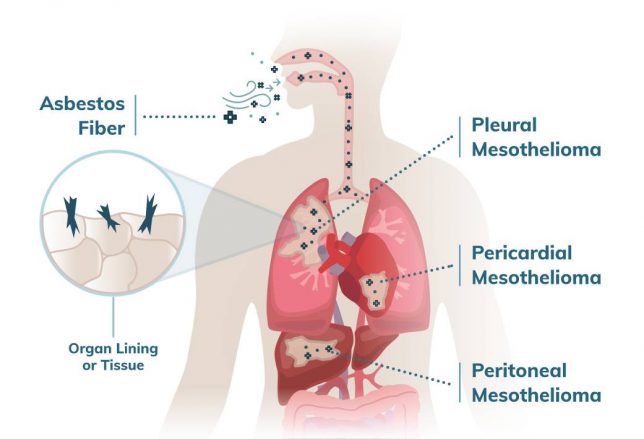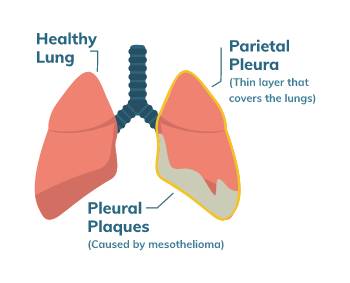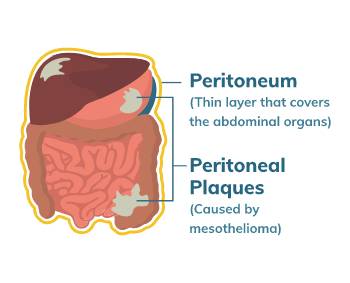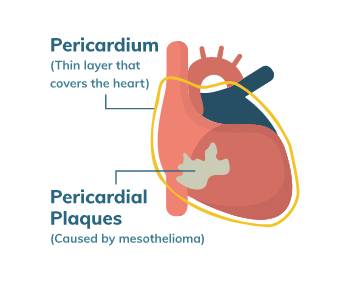Before talking about Mesothelioma Specialists, we will have to explain what Mesothelioma is and its causes/symptoms.
Mesothelioma is an asbestos-related cancer. It usually develops in the linings of the lungs or the abdomen. The usual life expectancy following diagnosis is 18 to 31 months, however, prognosis may improve with therapy. Chest discomfort, shortness of breath, and overall weariness are all possible symptoms.
What Are the Symptoms of Mesothelioma?
Mesothelioma symptoms might appear 10 to 50 years after first asbestos exposure. Symptoms are sometimes misdiagnosed as symptoms of less serious disorders, complicating early diagnosis. When symptoms appear, people should seek medical treatment since early discovery may improve the prognosis of mesothelioma.
Common Symptoms of Mesothelioma
- Chest pain or abdominal pain
- Shortness of breath
- Fluid build-up
- Fatigue
- Fever and night sweats
- Weight loss
Mesothelioma symptoms are sometimes misinterpreted as symptoms of other diseases. Coughing, shortness of breath, chest discomfort or abdominal pain, and fluid buildup are all signs of mesothelioma. Symptoms of pleural mesothelioma include chest discomfort and shortness of breath. Symptoms of peritoneal mesothelioma include stomach discomfort and bloating. Asbestos-related illnesses take years to manifest, making early identification difficult.
Causes of Mesothelioma
Asbestos is the sole and conclusive cause of mesothelioma. Asbestos fibres can get entrenched in the lining of the lungs, abdomen, or heart if breathed or swallowed. The fibres induce irritation and scarring over time. This irritation can eventually result in the formation of mesothelioma tumours.

Types of Mesothelioma
Based on the location of the tumour, there are four primary forms of mesothelioma. Malignant pleural mesothelioma is the most prevalent kind. Mesothelioma tumours are made up of many cell types. The three most prevalent forms of mesothelioma cells are epithelioid, sarcomatoid, and biphasic. Symptoms, prognosis, and treatment choices differ based on the kind of mesothelioma and the cell type.
1) Pleural Mesothelioma
What Is Pleural Mesothelioma?
Malignant pleural mesothelioma is a rare cancer of the pleura, or lining around the lungs. Asbestos fibres are at blame. The fibres can get embedded in the pleura after inhalation, producing inflammation and scarring. These mechanisms can eventually lead to the formation of mesothelioma tumours.

Pleural Mesothelioma Facts
The most frequent type of mesothelioma cancer is pleural malignant mesothelioma.
Pleural mesothelioma symptoms include chest discomfort, a dry cough, exhaustion, and shortness of breath.
Although some pleural mesothelioma patients have achieved long-term life with rigorous therapy, the malignancy is not considered curable.
The prognosis of a patient will vary based on their specific instance, with an average life expectancy of roughly 18 months.
Approximately 2,500 people are diagnosed with pleural mesothelioma each year.
Multiple tests, including scans and biopsies, are often used to make a diagnosis.
Chemotherapy, surgery, radiation treatment, and immunotherapy are frequently used to treat pleural mesothelioma.
Pleural Mesothelioma Symptoms
Malignant pleural mesothelioma develops in the lung linings (pleura). Symptoms frequently appear in the thoracic cavity (chest) and create breathing issues.
Common Pleural Mesothelioma Symptoms
- Chest pain
- Persistent dry cough or wheezing
- Shortness of breath
- Pleural effusion
- Unexplained weight loss
- Difficulty swallowing (dysphagia)
- Fatigue
- Loss of appetite
- Fever and night sweats
- Coughing up blood (hemoptysis)
- Body aches
- Blood clotting disorders
The flu, bronchitis, pneumonia, or lung cancer are all common misdiagnoses for pleural mesothelioma.
Pleural mesothelioma is a malignancy of the pleura or lining of the lungs. Inhaling asbestos fibres causes it. Malignant pleural mesothelioma is responsible for 80–90% of all mesothelioma diagnoses. Pleural mesothelioma symptoms include shortness of breath, a dry cough, and chest discomfort.
2) Pertoneal Mesothelioma

Peritoneal Mesothelioma Symptoms
Peritoneal mesothelioma is a cancer that develops in the lining of the abdomen (peritoneum). The majority of symptoms manifest in the abdomen area. Because the abdominal cavity contains various organs, peritoneal mesothelioma symptoms may vary depending on tumour location.
Common Peritoneal Mesothelioma Symptoms
- Abdominal bloating (distention)
- Abdominal pain
- Abdominal swelling
- Peritoneal effusion
- Nausea and vomiting
- Unexpected weight loss
- Loss of appetite (anorexia)
- Fever and night sweats
- Anemia
- Bowel obstruction
- Hernias
Irritable bowel syndrome (IBS) and Crohn’s disease are common misdiagnoses of peritoneal mesothelioma.
Other Symptoms of Peritoneal
Peritoneal mesothelioma is a cancer that develops in the lining of the abdomen (peritoneum). The majority of symptoms manifest in the abdomen area. Because the abdominal cavity contains various organs, peritoneal mesothelioma symptoms may vary depending on tumour location.
3) Pericardial Mesothelioma Symptoms

Pericardial mesothelioma develops in the heart’s lining (pericardium). Symptoms usually manifest in the thoracic cavity. Symptoms of pericardial mesothelioma often grow fast due to its aggressive nature.
Common Pericardial Mesothelioma Symptoms
- Chest pain
- Pericardial effusion
- Heart murmur
- Heart palpitations
- Irregular heartbeat (arrhythmia)
- Fever and night sweats
Pericardial mesothelioma is frequently misdiagnosed as coronary artery disease, heart failure, or other malignancies of the heart.
4) Testicular Mesothelioma Symptoms
Testicular mesothelioma develops in the testicular linings (tunica vaginalis testis). Though occurrences are rare, generally reported symptoms include testicular discomfort and swelling.
Common Testicular Mesothelioma Symptoms
- Fluid buildup
- Swelling around the scrotum (hydrocele)
- Testicular pain
- Inflammation of the epididymis (epididymitis)
- Lump or mass in the scrotum
- Testicular mesothelioma is extremely rare and often misdiagnosed as a hernia.
FIRST SIGNS OF MESOTHELIOMA
What Are the First Signs of Mesothelioma?
Mesothelioma symptoms might appear 10 to 50 years after asbestos exposure. Mesothelioma symptoms might vary depending on the location of the tumor and the stage of the disease. There are, however, common symptoms of the condition.
What Are the Most Common Mesothelioma Symptoms?
- Abdominal pain
- Chest pain
- Coughing or wheezing
- Difficulty breathing (dyspnea)
- Fatigue and muscle weakness
- Fever and night sweats
- Fluid buildup
- Loss of appetite
- Unexplained weight loss
Early indications of mesothelioma are especially difficult to identify since they are subtle. Symptoms are usually ignored or attributed to more prevalent illnesses. Early warning signals of the chest or abdominal discomfort and fluid buildup have been identified in studies. Depending on the site of the malignancy, the fluid buildup is referred to as pleural effusion or peritoneal effusion. Swelling or bloating are common symptoms of fluid buildup.
Tumour development causes symptoms to intensify in the latter stages of mesothelioma. Pain, lack of appetite, abrupt weight loss, and exhaustion are frequent late-stage warning symptoms.
Common Symptoms by Mesothelioma Type
Each form of mesothelioma manifests itself in a distinct part of the body. As a result, symptoms may differ between kinds. The origin of the tumour determines the kind of mesothelioma.
Doctors can establish a reliable diagnosis by identifying location-specific mesothelioma symptoms. The location of symptoms frequently dictates where imaging scans and biopsies are performed. A chest X-ray, for example, maybe required if you are having difficulty breathing.
Mesothelioma Symptoms by Stage
Symptoms of mesothelioma differ based on stage. Patients with stage 1 or stage 2 mesothelioma usually experience milder symptoms than those with stage 3 or stage 4 cancer.
Before talking about Mesothelioma Specialists, we will have to explain what Mesothelioma is and its causes/symptoms.
Mesothelioma is an asbestos-related cancer. It usually develops in the linings of the lungs or the abdomen. The usual life expectancy following diagnosis is 18 to 31 months, however, prognosis may improve with therapy. Chest discomfort, shortness of breath, and overall weariness are all possible symptoms.
What Are the Symptoms of Mesothelioma?
Mesothelioma symptoms might appear 10 to 50 years after first asbestos exposure. Symptoms are sometimes misdiagnosed as symptoms of less serious disorders, complicating early diagnosis. When symptoms appear, people should seek medical treatment since early discovery may improve the prognosis of mesothelioma.
Common Symptoms of Mesothelioma
- Chest pain or abdominal pain
- Shortness of breath
- Fluid build-up
- Fatigue
- Fever and night sweats
- Weight loss
Mesothelioma symptoms are sometimes misinterpreted as symptoms of other diseases. Coughing, shortness of breath, chest discomfort or abdominal pain, and fluid buildup are all signs of mesothelioma. Symptoms of pleural mesothelioma include chest discomfort and shortness of breath. Symptoms of peritoneal mesothelioma include stomach discomfort and bloating. Asbestos-related illnesses take years to manifest, making early identification difficult.
Causes of Mesothelioma
Asbestos is the sole and conclusive cause of mesothelioma. Asbestos fibres can get entrenched in the lining of the lungs, abdomen, or heart if breathed or swallowed. The fibres induce irritation and scarring over time. This irritation can eventually result in the formation of mesothelioma tumours.

Types of Mesothelioma
Based on the location of the tumour, there are four primary forms of mesothelioma. Malignant pleural mesothelioma is the most prevalent kind. Mesothelioma tumours are made up of many cell types. The three most prevalent forms of mesothelioma cells are epithelioid, sarcomatoid, and biphasic. Symptoms, prognosis, and treatment choices differ based on the kind of mesothelioma and the cell type.
1) Pleural Mesothelioma
What Is Pleural Mesothelioma?
Malignant pleural mesothelioma is a rare cancer of the pleura, or lining around the lungs. Asbestos fibres are at blame. The fibres can get embedded in the pleura after inhalation, producing inflammation and scarring. These mechanisms can eventually lead to the formation of mesothelioma tumours.

Pleural Mesothelioma Facts
The most frequent type of mesothelioma cancer is pleural malignant mesothelioma.
Pleural mesothelioma symptoms include chest discomfort, a dry cough, exhaustion, and shortness of breath.
Although some pleural mesothelioma patients have achieved long-term life with rigorous therapy, the malignancy is not considered curable.
The prognosis of a patient will vary based on their specific instance, with an average life expectancy of roughly 18 months.
Approximately 2,500 people are diagnosed with pleural mesothelioma each year.
Multiple tests, including scans and biopsies, are often used to make a diagnosis.
Chemotherapy, surgery, radiation treatment, and immunotherapy are frequently used to treat pleural mesothelioma.
Pleural Mesothelioma Symptoms
Malignant pleural mesothelioma develops in the lung linings (pleura). Symptoms frequently appear in the thoracic cavity (chest) and create breathing issues.
Common Pleural Mesothelioma Symptoms
- Chest pain
- Persistent dry cough or wheezing
- Shortness of breath
- Pleural effusion
- Unexplained weight loss
- Difficulty swallowing (dysphagia)
- Fatigue
- Loss of appetite
- Fever and night sweats
- Coughing up blood (hemoptysis)
- Body aches
- Blood clotting disorders
The flu, bronchitis, pneumonia, or lung cancer are all common misdiagnoses for pleural mesothelioma.
Pleural mesothelioma is a malignancy of the pleura or lining of the lungs. Inhaling asbestos fibres causes it. Malignant pleural mesothelioma is responsible for 80–90% of all mesothelioma diagnoses. Pleural mesothelioma symptoms include shortness of breath, a dry cough, and chest discomfort.
2) Pertoneal Mesothelioma

Peritoneal Mesothelioma Symptoms
Peritoneal mesothelioma is a cancer that develops in the lining of the abdomen (peritoneum). The majority of symptoms manifest in the abdomen area. Because the abdominal cavity contains various organs, peritoneal mesothelioma symptoms may vary depending on tumour location.
Common Peritoneal Mesothelioma Symptoms
- Abdominal bloating (distention)
- Abdominal pain
- Abdominal swelling
- Peritoneal effusion
- Nausea and vomiting
- Unexpected weight loss
- Loss of appetite (anorexia)
- Fever and night sweats
- Anemia
- Bowel obstruction
- Hernias
Irritable bowel syndrome (IBS) and Crohn’s disease are common misdiagnoses of peritoneal mesothelioma.
Other Symptoms of Peritoneal
Peritoneal mesothelioma is a cancer that develops in the lining of the abdomen (peritoneum). The majority of symptoms manifest in the abdomen area. Because the abdominal cavity contains various organs, peritoneal mesothelioma symptoms may vary depending on tumour location.
3) Pericardial Mesothelioma Symptoms

Pericardial mesothelioma develops in the heart’s lining (pericardium). Symptoms usually manifest in the thoracic cavity. Symptoms of pericardial mesothelioma often grow fast due to its aggressive nature.
Common Pericardial Mesothelioma Symptoms
- Chest pain
- Pericardial effusion
- Heart murmur
- Heart palpitations
- Irregular heartbeat (arrhythmia)
- Fever and night sweats
Pericardial mesothelioma is frequently misdiagnosed as coronary artery disease, heart failure, or other malignancies of the heart.
4) Testicular Mesothelioma Symptoms
Testicular mesothelioma develops in the testicular linings (tunica vaginalis testis). Though occurrences are rare, generally reported symptoms include testicular discomfort and swelling.
Common Testicular Mesothelioma Symptoms
- Fluid buildup
- Swelling around the scrotum (hydrocele)
- Testicular pain
- Inflammation of the epididymis (epididymitis)
- Lump or mass in the scrotum
- Testicular mesothelioma is extremely rare and often misdiagnosed as a hernia.
FIRST SIGNS OF MESOTHELIOMA
What Are the First Signs of Mesothelioma?
Mesothelioma symptoms might appear 10 to 50 years after asbestos exposure. Mesothelioma symptoms might vary depending on the location of the tumor and the stage of the disease. There are, however, common symptoms of the condition.
What Are the Most Common Mesothelioma Symptoms?
- Abdominal pain
- Chest pain
- Coughing or wheezing
- Difficulty breathing (dyspnea)
- Fatigue and muscle weakness
- Fever and night sweats
- Fluid buildup
- Loss of appetite
- Unexplained weight loss
Early indications of mesothelioma are especially difficult to identify since they are subtle. Symptoms are usually ignored or attributed to more prevalent illnesses. Early warning signals of the chest or abdominal discomfort and fluid buildup have been identified in studies. Depending on the site of the malignancy, the fluid buildup is referred to as pleural effusion or peritoneal effusion. Swelling or bloating are common symptoms of fluid buildup.
Tumour development causes symptoms to intensify in the latter stages of mesothelioma. Pain, lack of appetite, abrupt weight loss, and exhaustion are frequent late-stage warning symptoms.
Common Symptoms by Mesothelioma Type
Each form of mesothelioma manifests itself in a distinct part of the body. As a result, symptoms may differ between kinds. The origin of the tumour determines the kind of mesothelioma.
Doctors can establish a reliable diagnosis by identifying location-specific mesothelioma symptoms. The location of symptoms frequently dictates where imaging scans and biopsies are performed. A chest X-ray, for example, maybe required if you are having difficulty breathing.
Mesothelioma Symptoms by Stage
Symptoms of mesothelioma differ based on stage. Patients with stage 1 or stage 2 mesothelioma usually experience milder symptoms than those with stage 3 or stage 4 cancer.
Before talking about Mesothelioma Specialists, we will have to explain what Mesothelioma is and its causes/symptoms.
Mesothelioma is an asbestos-related cancer. It usually develops in the linings of the lungs or the abdomen. The usual life expectancy following diagnosis is 18 to 31 months, however, prognosis may improve with therapy. Chest discomfort, shortness of breath, and overall weariness are all possible symptoms.
What Are the Symptoms of Mesothelioma?
Mesothelioma symptoms might appear 10 to 50 years after first asbestos exposure. Symptoms are sometimes misdiagnosed as symptoms of less serious disorders, complicating early diagnosis. When symptoms appear, people should seek medical treatment since early discovery may improve the prognosis of mesothelioma.
Common Symptoms of Mesothelioma
- Chest pain or abdominal pain
- Shortness of breath
- Fluid build-up
- Fatigue
- Fever and night sweats
- Weight loss
Mesothelioma symptoms are sometimes misinterpreted as symptoms of other diseases. Coughing, shortness of breath, chest discomfort or abdominal pain, and fluid buildup are all signs of mesothelioma. Symptoms of pleural mesothelioma include chest discomfort and shortness of breath. Symptoms of peritoneal mesothelioma include stomach discomfort and bloating. Asbestos-related illnesses take years to manifest, making early identification difficult.
Causes of Mesothelioma
Asbestos is the sole and conclusive cause of mesothelioma. Asbestos fibres can get entrenched in the lining of the lungs, abdomen, or heart if breathed or swallowed. The fibres induce irritation and scarring over time. This irritation can eventually result in the formation of mesothelioma tumours.

Types of Mesothelioma
Based on the location of the tumour, there are four primary forms of mesothelioma. Malignant pleural mesothelioma is the most prevalent kind. Mesothelioma tumours are made up of many cell types. The three most prevalent forms of mesothelioma cells are epithelioid, sarcomatoid, and biphasic. Symptoms, prognosis, and treatment choices differ based on the kind of mesothelioma and the cell type.
1) Pleural Mesothelioma
What Is Pleural Mesothelioma?
Malignant pleural mesothelioma is a rare cancer of the pleura, or lining around the lungs. Asbestos fibres are at blame. The fibres can get embedded in the pleura after inhalation, producing inflammation and scarring. These mechanisms can eventually lead to the formation of mesothelioma tumours.

Pleural Mesothelioma Facts
The most frequent type of mesothelioma cancer is pleural malignant mesothelioma.
Pleural mesothelioma symptoms include chest discomfort, a dry cough, exhaustion, and shortness of breath.
Although some pleural mesothelioma patients have achieved long-term life with rigorous therapy, the malignancy is not considered curable.
The prognosis of a patient will vary based on their specific instance, with an average life expectancy of roughly 18 months.
Approximately 2,500 people are diagnosed with pleural mesothelioma each year.
Multiple tests, including scans and biopsies, are often used to make a diagnosis.
Chemotherapy, surgery, radiation treatment, and immunotherapy are frequently used to treat pleural mesothelioma.
Pleural Mesothelioma Symptoms
Malignant pleural mesothelioma develops in the lung linings (pleura). Symptoms frequently appear in the thoracic cavity (chest) and create breathing issues.
Common Pleural Mesothelioma Symptoms
- Chest pain
- Persistent dry cough or wheezing
- Shortness of breath
- Pleural effusion
- Unexplained weight loss
- Difficulty swallowing (dysphagia)
- Fatigue
- Loss of appetite
- Fever and night sweats
- Coughing up blood (hemoptysis)
- Body aches
- Blood clotting disorders
The flu, bronchitis, pneumonia, or lung cancer are all common misdiagnoses for pleural mesothelioma.
Pleural mesothelioma is a malignancy of the pleura or lining of the lungs. Inhaling asbestos fibres causes it. Malignant pleural mesothelioma is responsible for 80–90% of all mesothelioma diagnoses. Pleural mesothelioma symptoms include shortness of breath, a dry cough, and chest discomfort.
2) Pertoneal Mesothelioma

Peritoneal Mesothelioma Symptoms
Peritoneal mesothelioma is a cancer that develops in the lining of the abdomen (peritoneum). The majority of symptoms manifest in the abdomen area. Because the abdominal cavity contains various organs, peritoneal mesothelioma symptoms may vary depending on tumour location.
Common Peritoneal Mesothelioma Symptoms
- Abdominal bloating (distention)
- Abdominal pain
- Abdominal swelling
- Peritoneal effusion
- Nausea and vomiting
- Unexpected weight loss
- Loss of appetite (anorexia)
- Fever and night sweats
- Anemia
- Bowel obstruction
- Hernias
Irritable bowel syndrome (IBS) and Crohn’s disease are common misdiagnoses of peritoneal mesothelioma.
Other Symptoms of Peritoneal
Peritoneal mesothelioma is a cancer that develops in the lining of the abdomen (peritoneum). The majority of symptoms manifest in the abdomen area. Because the abdominal cavity contains various organs, peritoneal mesothelioma symptoms may vary depending on tumour location.
3) Pericardial Mesothelioma Symptoms

Pericardial mesothelioma develops in the heart’s lining (pericardium). Symptoms usually manifest in the thoracic cavity. Symptoms of pericardial mesothelioma often grow fast due to its aggressive nature.
Common Pericardial Mesothelioma Symptoms
- Chest pain
- Pericardial effusion
- Heart murmur
- Heart palpitations
- Irregular heartbeat (arrhythmia)
- Fever and night sweats
Pericardial mesothelioma is frequently misdiagnosed as coronary artery disease, heart failure, or other malignancies of the heart.
4) Testicular Mesothelioma Symptoms
Testicular mesothelioma develops in the testicular linings (tunica vaginalis testis). Though occurrences are rare, generally reported symptoms include testicular discomfort and swelling.
Common Testicular Mesothelioma Symptoms
- Fluid buildup
- Swelling around the scrotum (hydrocele)
- Testicular pain
- Inflammation of the epididymis (epididymitis)
- Lump or mass in the scrotum
- Testicular mesothelioma is extremely rare and often misdiagnosed as a hernia.
FIRST SIGNS OF MESOTHELIOMA
What Are the First Signs of Mesothelioma?
Mesothelioma symptoms might appear 10 to 50 years after asbestos exposure. Mesothelioma symptoms might vary depending on the location of the tumor and the stage of the disease. There are, however, common symptoms of the condition.
What Are the Most Common Mesothelioma Symptoms?
- Abdominal pain
- Chest pain
- Coughing or wheezing
- Difficulty breathing (dyspnea)
- Fatigue and muscle weakness
- Fever and night sweats
- Fluid buildup
- Loss of appetite
- Unexplained weight loss
Early indications of mesothelioma are especially difficult to identify since they are subtle. Symptoms are usually ignored or attributed to more prevalent illnesses. Early warning signals of the chest or abdominal discomfort and fluid buildup have been identified in studies. Depending on the site of the malignancy, the fluid buildup is referred to as pleural effusion or peritoneal effusion. Swelling or bloating are common symptoms of fluid buildup.
Tumour development causes symptoms to intensify in the latter stages of mesothelioma. Pain, lack of appetite, abrupt weight loss, and exhaustion are frequent late-stage warning symptoms.
Common Symptoms by Mesothelioma Type
Each form of mesothelioma manifests itself in a distinct part of the body. As a result, symptoms may differ between kinds. The origin of the tumour determines the kind of mesothelioma.
Doctors can establish a reliable diagnosis by identifying location-specific mesothelioma symptoms. The location of symptoms frequently dictates where imaging scans and biopsies are performed. A chest X-ray, for example, maybe required if you are having difficulty breathing.
Mesothelioma Symptoms by Stage
Symptoms of mesothelioma differ based on stage. Patients with stage 1 or stage 2 mesothelioma usually experience milder symptoms than those with stage 3 or stage 4 cancer.
Before talking about Mesothelioma Specialists, we will have to explain what Mesothelioma is and its causes/symptoms.
Mesothelioma is an asbestos-related cancer. It usually develops in the linings of the lungs or the abdomen. The usual life expectancy following diagnosis is 18 to 31 months, however, prognosis may improve with therapy. Chest discomfort, shortness of breath, and overall weariness are all possible symptoms.
What Are the Symptoms of Mesothelioma?
Mesothelioma symptoms might appear 10 to 50 years after first asbestos exposure. Symptoms are sometimes misdiagnosed as symptoms of less serious disorders, complicating early diagnosis. When symptoms appear, people should seek medical treatment since early discovery may improve the prognosis of mesothelioma.
Common Symptoms of Mesothelioma
- Chest pain or abdominal pain
- Shortness of breath
- Fluid build-up
- Fatigue
- Fever and night sweats
- Weight loss
Mesothelioma symptoms are sometimes misinterpreted as symptoms of other diseases. Coughing, shortness of breath, chest discomfort or abdominal pain, and fluid buildup are all signs of mesothelioma. Symptoms of pleural mesothelioma include chest discomfort and shortness of breath. Symptoms of peritoneal mesothelioma include stomach discomfort and bloating. Asbestos-related illnesses take years to manifest, making early identification difficult.
Causes of Mesothelioma
Asbestos is the sole and conclusive cause of mesothelioma. Asbestos fibres can get entrenched in the lining of the lungs, abdomen, or heart if breathed or swallowed. The fibres induce irritation and scarring over time. This irritation can eventually result in the formation of mesothelioma tumours.

Types of Mesothelioma
Based on the location of the tumour, there are four primary forms of mesothelioma. Malignant pleural mesothelioma is the most prevalent kind. Mesothelioma tumours are made up of many cell types. The three most prevalent forms of mesothelioma cells are epithelioid, sarcomatoid, and biphasic. Symptoms, prognosis, and treatment choices differ based on the kind of mesothelioma and the cell type.
1) Pleural Mesothelioma
What Is Pleural Mesothelioma?
Malignant pleural mesothelioma is a rare cancer of the pleura, or lining around the lungs. Asbestos fibres are at blame. The fibres can get embedded in the pleura after inhalation, producing inflammation and scarring. These mechanisms can eventually lead to the formation of mesothelioma tumours.

Pleural Mesothelioma Facts
The most frequent type of mesothelioma cancer is pleural malignant mesothelioma.
Pleural mesothelioma symptoms include chest discomfort, a dry cough, exhaustion, and shortness of breath.
Although some pleural mesothelioma patients have achieved long-term life with rigorous therapy, the malignancy is not considered curable.
The prognosis of a patient will vary based on their specific instance, with an average life expectancy of roughly 18 months.
Approximately 2,500 people are diagnosed with pleural mesothelioma each year.
Multiple tests, including scans and biopsies, are often used to make a diagnosis.
Chemotherapy, surgery, radiation treatment, and immunotherapy are frequently used to treat pleural mesothelioma.
Pleural Mesothelioma Symptoms
Malignant pleural mesothelioma develops in the lung linings (pleura). Symptoms frequently appear in the thoracic cavity (chest) and create breathing issues.
Common Pleural Mesothelioma Symptoms
- Chest pain
- Persistent dry cough or wheezing
- Shortness of breath
- Pleural effusion
- Unexplained weight loss
- Difficulty swallowing (dysphagia)
- Fatigue
- Loss of appetite
- Fever and night sweats
- Coughing up blood (hemoptysis)
- Body aches
- Blood clotting disorders
The flu, bronchitis, pneumonia, or lung cancer are all common misdiagnoses for pleural mesothelioma.
Pleural mesothelioma is a malignancy of the pleura or lining of the lungs. Inhaling asbestos fibres causes it. Malignant pleural mesothelioma is responsible for 80–90% of all mesothelioma diagnoses. Pleural mesothelioma symptoms include shortness of breath, a dry cough, and chest discomfort.
2) Pertoneal Mesothelioma

Peritoneal Mesothelioma Symptoms
Peritoneal mesothelioma is a cancer that develops in the lining of the abdomen (peritoneum). The majority of symptoms manifest in the abdomen area. Because the abdominal cavity contains various organs, peritoneal mesothelioma symptoms may vary depending on tumour location.
Common Peritoneal Mesothelioma Symptoms
- Abdominal bloating (distention)
- Abdominal pain
- Abdominal swelling
- Peritoneal effusion
- Nausea and vomiting
- Unexpected weight loss
- Loss of appetite (anorexia)
- Fever and night sweats
- Anemia
- Bowel obstruction
- Hernias
Irritable bowel syndrome (IBS) and Crohn’s disease are common misdiagnoses of peritoneal mesothelioma.
Other Symptoms of Peritoneal
Peritoneal mesothelioma is a cancer that develops in the lining of the abdomen (peritoneum). The majority of symptoms manifest in the abdomen area. Because the abdominal cavity contains various organs, peritoneal mesothelioma symptoms may vary depending on tumour location.
3) Pericardial Mesothelioma Symptoms

Pericardial mesothelioma develops in the heart’s lining (pericardium). Symptoms usually manifest in the thoracic cavity. Symptoms of pericardial mesothelioma often grow fast due to its aggressive nature.
Common Pericardial Mesothelioma Symptoms
- Chest pain
- Pericardial effusion
- Heart murmur
- Heart palpitations
- Irregular heartbeat (arrhythmia)
- Fever and night sweats
Pericardial mesothelioma is frequently misdiagnosed as coronary artery disease, heart failure, or other malignancies of the heart.
4) Testicular Mesothelioma Symptoms
Testicular mesothelioma develops in the testicular linings (tunica vaginalis testis). Though occurrences are rare, generally reported symptoms include testicular discomfort and swelling.
Common Testicular Mesothelioma Symptoms
- Fluid buildup
- Swelling around the scrotum (hydrocele)
- Testicular pain
- Inflammation of the epididymis (epididymitis)
- Lump or mass in the scrotum
- Testicular mesothelioma is extremely rare and often misdiagnosed as a hernia.
FIRST SIGNS OF MESOTHELIOMA
What Are the First Signs of Mesothelioma?
Mesothelioma symptoms might appear 10 to 50 years after asbestos exposure. Mesothelioma symptoms might vary depending on the location of the tumor and the stage of the disease. There are, however, common symptoms of the condition.
What Are the Most Common Mesothelioma Symptoms?
- Abdominal pain
- Chest pain
- Coughing or wheezing
- Difficulty breathing (dyspnea)
- Fatigue and muscle weakness
- Fever and night sweats
- Fluid buildup
- Loss of appetite
- Unexplained weight loss
Early indications of mesothelioma are especially difficult to identify since they are subtle. Symptoms are usually ignored or attributed to more prevalent illnesses. Early warning signals of the chest or abdominal discomfort and fluid buildup have been identified in studies. Depending on the site of the malignancy, the fluid buildup is referred to as pleural effusion or peritoneal effusion. Swelling or bloating are common symptoms of fluid buildup.
Tumour development causes symptoms to intensify in the latter stages of mesothelioma. Pain, lack of appetite, abrupt weight loss, and exhaustion are frequent late-stage warning symptoms.
Common Symptoms by Mesothelioma Type
Each form of mesothelioma manifests itself in a distinct part of the body. As a result, symptoms may differ between kinds. The origin of the tumour determines the kind of mesothelioma.
Doctors can establish a reliable diagnosis by identifying location-specific mesothelioma symptoms. The location of symptoms frequently dictates where imaging scans and biopsies are performed. A chest X-ray, for example, maybe required if you are having difficulty breathing.
Mesothelioma Symptoms by Stage
Symptoms of mesothelioma differ based on stage. Patients with stage 1 or stage 2 mesothelioma usually experience milder symptoms than those with stage 3 or stage 4 cancer.
Before talking about Mesothelioma Specialists, we will have to explain what Mesothelioma is and its causes/symptoms.
Mesothelioma is an asbestos-related cancer. It usually develops in the linings of the lungs or the abdomen. The usual life expectancy following diagnosis is 18 to 31 months, however, prognosis may improve with therapy. Chest discomfort, shortness of breath, and overall weariness are all possible symptoms.
What Are the Symptoms of Mesothelioma?
Mesothelioma symptoms might appear 10 to 50 years after first asbestos exposure. Symptoms are sometimes misdiagnosed as symptoms of less serious disorders, complicating early diagnosis. When symptoms appear, people should seek medical treatment since early discovery may improve the prognosis of mesothelioma.
Common Symptoms of Mesothelioma
- Chest pain or abdominal pain
- Shortness of breath
- Fluid build-up
- Fatigue
- Fever and night sweats
- Weight loss
Mesothelioma symptoms are sometimes misinterpreted as symptoms of other diseases. Coughing, shortness of breath, chest discomfort or abdominal pain, and fluid buildup are all signs of mesothelioma. Symptoms of pleural mesothelioma include chest discomfort and shortness of breath. Symptoms of peritoneal mesothelioma include stomach discomfort and bloating. Asbestos-related illnesses take years to manifest, making early identification difficult.
Causes of Mesothelioma
Asbestos is the sole and conclusive cause of mesothelioma. Asbestos fibres can get entrenched in the lining of the lungs, abdomen, or heart if breathed or swallowed. The fibres induce irritation and scarring over time. This irritation can eventually result in the formation of mesothelioma tumours.

Types of Mesothelioma
Based on the location of the tumour, there are four primary forms of mesothelioma. Malignant pleural mesothelioma is the most prevalent kind. Mesothelioma tumours are made up of many cell types. The three most prevalent forms of mesothelioma cells are epithelioid, sarcomatoid, and biphasic. Symptoms, prognosis, and treatment choices differ based on the kind of mesothelioma and the cell type.
1) Pleural Mesothelioma
What Is Pleural Mesothelioma?
Malignant pleural mesothelioma is a rare cancer of the pleura, or lining around the lungs. Asbestos fibres are at blame. The fibres can get embedded in the pleura after inhalation, producing inflammation and scarring. These mechanisms can eventually lead to the formation of mesothelioma tumours.

Pleural Mesothelioma Facts
The most frequent type of mesothelioma cancer is pleural malignant mesothelioma.
Pleural mesothelioma symptoms include chest discomfort, a dry cough, exhaustion, and shortness of breath.
Although some pleural mesothelioma patients have achieved long-term life with rigorous therapy, the malignancy is not considered curable.
The prognosis of a patient will vary based on their specific instance, with an average life expectancy of roughly 18 months.
Approximately 2,500 people are diagnosed with pleural mesothelioma each year.
Multiple tests, including scans and biopsies, are often used to make a diagnosis.
Chemotherapy, surgery, radiation treatment, and immunotherapy are frequently used to treat pleural mesothelioma.
Pleural Mesothelioma Symptoms
Malignant pleural mesothelioma develops in the lung linings (pleura). Symptoms frequently appear in the thoracic cavity (chest) and create breathing issues.
Common Pleural Mesothelioma Symptoms
- Chest pain
- Persistent dry cough or wheezing
- Shortness of breath
- Pleural effusion
- Unexplained weight loss
- Difficulty swallowing (dysphagia)
- Fatigue
- Loss of appetite
- Fever and night sweats
- Coughing up blood (hemoptysis)
- Body aches
- Blood clotting disorders
The flu, bronchitis, pneumonia, or lung cancer are all common misdiagnoses for pleural mesothelioma.
Pleural mesothelioma is a malignancy of the pleura or lining of the lungs. Inhaling asbestos fibres causes it. Malignant pleural mesothelioma is responsible for 80–90% of all mesothelioma diagnoses. Pleural mesothelioma symptoms include shortness of breath, a dry cough, and chest discomfort.
2) Pertoneal Mesothelioma

Peritoneal Mesothelioma Symptoms
Peritoneal mesothelioma is a cancer that develops in the lining of the abdomen (peritoneum). The majority of symptoms manifest in the abdomen area. Because the abdominal cavity contains various organs, peritoneal mesothelioma symptoms may vary depending on tumour location.
Common Peritoneal Mesothelioma Symptoms
- Abdominal bloating (distention)
- Abdominal pain
- Abdominal swelling
- Peritoneal effusion
- Nausea and vomiting
- Unexpected weight loss
- Loss of appetite (anorexia)
- Fever and night sweats
- Anemia
- Bowel obstruction
- Hernias
Irritable bowel syndrome (IBS) and Crohn’s disease are common misdiagnoses of peritoneal mesothelioma.
Other Symptoms of Peritoneal
Peritoneal mesothelioma is a cancer that develops in the lining of the abdomen (peritoneum). The majority of symptoms manifest in the abdomen area. Because the abdominal cavity contains various organs, peritoneal mesothelioma symptoms may vary depending on tumour location.
3) Pericardial Mesothelioma Symptoms

Pericardial mesothelioma develops in the heart’s lining (pericardium). Symptoms usually manifest in the thoracic cavity. Symptoms of pericardial mesothelioma often grow fast due to its aggressive nature.
Common Pericardial Mesothelioma Symptoms
- Chest pain
- Pericardial effusion
- Heart murmur
- Heart palpitations
- Irregular heartbeat (arrhythmia)
- Fever and night sweats
Pericardial mesothelioma is frequently misdiagnosed as coronary artery disease, heart failure, or other malignancies of the heart.
4) Testicular Mesothelioma Symptoms
Testicular mesothelioma develops in the testicular linings (tunica vaginalis testis). Though occurrences are rare, generally reported symptoms include testicular discomfort and swelling.
Common Testicular Mesothelioma Symptoms
- Fluid buildup
- Swelling around the scrotum (hydrocele)
- Testicular pain
- Inflammation of the epididymis (epididymitis)
- Lump or mass in the scrotum
- Testicular mesothelioma is extremely rare and often misdiagnosed as a hernia.
FIRST SIGNS OF MESOTHELIOMA
What Are the First Signs of Mesothelioma?
Mesothelioma symptoms might appear 10 to 50 years after asbestos exposure. Mesothelioma symptoms might vary depending on the location of the tumor and the stage of the disease. There are, however, common symptoms of the condition.
What Are the Most Common Mesothelioma Symptoms?
- Abdominal pain
- Chest pain
- Coughing or wheezing
- Difficulty breathing (dyspnea)
- Fatigue and muscle weakness
- Fever and night sweats
- Fluid buildup
- Loss of appetite
- Unexplained weight loss
Early indications of mesothelioma are especially difficult to identify since they are subtle. Symptoms are usually ignored or attributed to more prevalent illnesses. Early warning signals of the chest or abdominal discomfort and fluid buildup have been identified in studies. Depending on the site of the malignancy, the fluid buildup is referred to as pleural effusion or peritoneal effusion. Swelling or bloating are common symptoms of fluid buildup.
Tumour development causes symptoms to intensify in the latter stages of mesothelioma. Pain, lack of appetite, abrupt weight loss, and exhaustion are frequent late-stage warning symptoms.
Common Symptoms by Mesothelioma Type
Each form of mesothelioma manifests itself in a distinct part of the body. As a result, symptoms may differ between kinds. The origin of the tumour determines the kind of mesothelioma.
Doctors can establish a reliable diagnosis by identifying location-specific mesothelioma symptoms. The location of symptoms frequently dictates where imaging scans and biopsies are performed. A chest X-ray, for example, maybe required if you are having difficulty breathing.
Mesothelioma Symptoms by Stage
Symptoms of mesothelioma differ based on stage. Patients with stage 1 or stage 2 mesothelioma usually experience milder symptoms than those with stage 3 or stage 4 cancer.
Before talking about Mesothelioma Specialists, we will have to explain what Mesothelioma is and its causes/symptoms.
Mesothelioma is an asbestos-related cancer. It usually develops in the linings of the lungs or the abdomen. The usual life expectancy following diagnosis is 18 to 31 months, however, prognosis may improve with therapy. Chest discomfort, shortness of breath, and overall weariness are all possible symptoms.
What Are the Symptoms of Mesothelioma?
Mesothelioma symptoms might appear 10 to 50 years after first asbestos exposure. Symptoms are sometimes misdiagnosed as symptoms of less serious disorders, complicating early diagnosis. When symptoms appear, people should seek medical treatment since early discovery may improve the prognosis of mesothelioma.
Common Symptoms of Mesothelioma
- Chest pain or abdominal pain
- Shortness of breath
- Fluid build-up
- Fatigue
- Fever and night sweats
- Weight loss
Mesothelioma symptoms are sometimes misinterpreted as symptoms of other diseases. Coughing, shortness of breath, chest discomfort or abdominal pain, and fluid buildup are all signs of mesothelioma. Symptoms of pleural mesothelioma include chest discomfort and shortness of breath. Symptoms of peritoneal mesothelioma include stomach discomfort and bloating. Asbestos-related illnesses take years to manifest, making early identification difficult.
Causes of Mesothelioma
Asbestos is the sole and conclusive cause of mesothelioma. Asbestos fibres can get entrenched in the lining of the lungs, abdomen, or heart if breathed or swallowed. The fibres induce irritation and scarring over time. This irritation can eventually result in the formation of mesothelioma tumours.

Types of Mesothelioma
Based on the location of the tumour, there are four primary forms of mesothelioma. Malignant pleural mesothelioma is the most prevalent kind. Mesothelioma tumours are made up of many cell types. The three most prevalent forms of mesothelioma cells are epithelioid, sarcomatoid, and biphasic. Symptoms, prognosis, and treatment choices differ based on the kind of mesothelioma and the cell type.
1) Pleural Mesothelioma
What Is Pleural Mesothelioma?
Malignant pleural mesothelioma is a rare cancer of the pleura, or lining around the lungs. Asbestos fibres are at blame. The fibres can get embedded in the pleura after inhalation, producing inflammation and scarring. These mechanisms can eventually lead to the formation of mesothelioma tumours.

Pleural Mesothelioma Facts
The most frequent type of mesothelioma cancer is pleural malignant mesothelioma.
Pleural mesothelioma symptoms include chest discomfort, a dry cough, exhaustion, and shortness of breath.
Although some pleural mesothelioma patients have achieved long-term life with rigorous therapy, the malignancy is not considered curable.
The prognosis of a patient will vary based on their specific instance, with an average life expectancy of roughly 18 months.
Approximately 2,500 people are diagnosed with pleural mesothelioma each year.
Multiple tests, including scans and biopsies, are often used to make a diagnosis.
Chemotherapy, surgery, radiation treatment, and immunotherapy are frequently used to treat pleural mesothelioma.
Pleural Mesothelioma Symptoms
Malignant pleural mesothelioma develops in the lung linings (pleura). Symptoms frequently appear in the thoracic cavity (chest) and create breathing issues.
Common Pleural Mesothelioma Symptoms
- Chest pain
- Persistent dry cough or wheezing
- Shortness of breath
- Pleural effusion
- Unexplained weight loss
- Difficulty swallowing (dysphagia)
- Fatigue
- Loss of appetite
- Fever and night sweats
- Coughing up blood (hemoptysis)
- Body aches
- Blood clotting disorders
The flu, bronchitis, pneumonia, or lung cancer are all common misdiagnoses for pleural mesothelioma.
Pleural mesothelioma is a malignancy of the pleura or lining of the lungs. Inhaling asbestos fibres causes it. Malignant pleural mesothelioma is responsible for 80–90% of all mesothelioma diagnoses. Pleural mesothelioma symptoms include shortness of breath, a dry cough, and chest discomfort.
2) Pertoneal Mesothelioma

Peritoneal Mesothelioma Symptoms
Peritoneal mesothelioma is a cancer that develops in the lining of the abdomen (peritoneum). The majority of symptoms manifest in the abdomen area. Because the abdominal cavity contains various organs, peritoneal mesothelioma symptoms may vary depending on tumour location.
Common Peritoneal Mesothelioma Symptoms
- Abdominal bloating (distention)
- Abdominal pain
- Abdominal swelling
- Peritoneal effusion
- Nausea and vomiting
- Unexpected weight loss
- Loss of appetite (anorexia)
- Fever and night sweats
- Anemia
- Bowel obstruction
- Hernias
Irritable bowel syndrome (IBS) and Crohn’s disease are common misdiagnoses of peritoneal mesothelioma.
Other Symptoms of Peritoneal
Peritoneal mesothelioma is a cancer that develops in the lining of the abdomen (peritoneum). The majority of symptoms manifest in the abdomen area. Because the abdominal cavity contains various organs, peritoneal mesothelioma symptoms may vary depending on tumour location.
3) Pericardial Mesothelioma Symptoms

Pericardial mesothelioma develops in the heart’s lining (pericardium). Symptoms usually manifest in the thoracic cavity. Symptoms of pericardial mesothelioma often grow fast due to its aggressive nature.
Common Pericardial Mesothelioma Symptoms
- Chest pain
- Pericardial effusion
- Heart murmur
- Heart palpitations
- Irregular heartbeat (arrhythmia)
- Fever and night sweats
Pericardial mesothelioma is frequently misdiagnosed as coronary artery disease, heart failure, or other malignancies of the heart.
4) Testicular Mesothelioma Symptoms
Testicular mesothelioma develops in the testicular linings (tunica vaginalis testis). Though occurrences are rare, generally reported symptoms include testicular discomfort and swelling.
Common Testicular Mesothelioma Symptoms
- Fluid buildup
- Swelling around the scrotum (hydrocele)
- Testicular pain
- Inflammation of the epididymis (epididymitis)
- Lump or mass in the scrotum
- Testicular mesothelioma is extremely rare and often misdiagnosed as a hernia.
FIRST SIGNS OF MESOTHELIOMA
What Are the First Signs of Mesothelioma?
Mesothelioma symptoms might appear 10 to 50 years after asbestos exposure. Mesothelioma symptoms might vary depending on the location of the tumor and the stage of the disease. There are, however, common symptoms of the condition.
What Are the Most Common Mesothelioma Symptoms?
- Abdominal pain
- Chest pain
- Coughing or wheezing
- Difficulty breathing (dyspnea)
- Fatigue and muscle weakness
- Fever and night sweats
- Fluid buildup
- Loss of appetite
- Unexplained weight loss
Early indications of mesothelioma are especially difficult to identify since they are subtle. Symptoms are usually ignored or attributed to more prevalent illnesses. Early warning signals of the chest or abdominal discomfort and fluid buildup have been identified in studies. Depending on the site of the malignancy, the fluid buildup is referred to as pleural effusion or peritoneal effusion. Swelling or bloating are common symptoms of fluid buildup.
Tumour development causes symptoms to intensify in the latter stages of mesothelioma. Pain, lack of appetite, abrupt weight loss, and exhaustion are frequent late-stage warning symptoms.
Common Symptoms by Mesothelioma Type
Each form of mesothelioma manifests itself in a distinct part of the body. As a result, symptoms may differ between kinds. The origin of the tumour determines the kind of mesothelioma.
Doctors can establish a reliable diagnosis by identifying location-specific mesothelioma symptoms. The location of symptoms frequently dictates where imaging scans and biopsies are performed. A chest X-ray, for example, maybe required if you are having difficulty breathing.
Mesothelioma Symptoms by Stage
Symptoms of mesothelioma differ based on stage. Patients with stage 1 or stage 2 mesothelioma usually experience milder symptoms than those with stage 3 or stage 4 cancer.
Before talking about Mesothelioma Specialists, we will have to explain what Mesothelioma is and its causes/symptoms.
Mesothelioma is an asbestos-related cancer. It usually develops in the linings of the lungs or the abdomen. The usual life expectancy following diagnosis is 18 to 31 months, however, prognosis may improve with therapy. Chest discomfort, shortness of breath, and overall weariness are all possible symptoms.
What Are the Symptoms of Mesothelioma?
Mesothelioma symptoms might appear 10 to 50 years after first asbestos exposure. Symptoms are sometimes misdiagnosed as symptoms of less serious disorders, complicating early diagnosis. When symptoms appear, people should seek medical treatment since early discovery may improve the prognosis of mesothelioma.
Common Symptoms of Mesothelioma
- Chest pain or abdominal pain
- Shortness of breath
- Fluid build-up
- Fatigue
- Fever and night sweats
- Weight loss
Mesothelioma symptoms are sometimes misinterpreted as symptoms of other diseases. Coughing, shortness of breath, chest discomfort or abdominal pain, and fluid buildup are all signs of mesothelioma. Symptoms of pleural mesothelioma include chest discomfort and shortness of breath. Symptoms of peritoneal mesothelioma include stomach discomfort and bloating. Asbestos-related illnesses take years to manifest, making early identification difficult.
Causes of Mesothelioma
Asbestos is the sole and conclusive cause of mesothelioma. Asbestos fibres can get entrenched in the lining of the lungs, abdomen, or heart if breathed or swallowed. The fibres induce irritation and scarring over time. This irritation can eventually result in the formation of mesothelioma tumours.

Types of Mesothelioma
Based on the location of the tumour, there are four primary forms of mesothelioma. Malignant pleural mesothelioma is the most prevalent kind. Mesothelioma tumours are made up of many cell types. The three most prevalent forms of mesothelioma cells are epithelioid, sarcomatoid, and biphasic. Symptoms, prognosis, and treatment choices differ based on the kind of mesothelioma and the cell type.
1) Pleural Mesothelioma
What Is Pleural Mesothelioma?
Malignant pleural mesothelioma is a rare cancer of the pleura, or lining around the lungs. Asbestos fibres are at blame. The fibres can get embedded in the pleura after inhalation, producing inflammation and scarring. These mechanisms can eventually lead to the formation of mesothelioma tumours.

Pleural Mesothelioma Facts
The most frequent type of mesothelioma cancer is pleural malignant mesothelioma.
Pleural mesothelioma symptoms include chest discomfort, a dry cough, exhaustion, and shortness of breath.
Although some pleural mesothelioma patients have achieved long-term life with rigorous therapy, the malignancy is not considered curable.
The prognosis of a patient will vary based on their specific instance, with an average life expectancy of roughly 18 months.
Approximately 2,500 people are diagnosed with pleural mesothelioma each year.
Multiple tests, including scans and biopsies, are often used to make a diagnosis.
Chemotherapy, surgery, radiation treatment, and immunotherapy are frequently used to treat pleural mesothelioma.
Pleural Mesothelioma Symptoms
Malignant pleural mesothelioma develops in the lung linings (pleura). Symptoms frequently appear in the thoracic cavity (chest) and create breathing issues.
Common Pleural Mesothelioma Symptoms
- Chest pain
- Persistent dry cough or wheezing
- Shortness of breath
- Pleural effusion
- Unexplained weight loss
- Difficulty swallowing (dysphagia)
- Fatigue
- Loss of appetite
- Fever and night sweats
- Coughing up blood (hemoptysis)
- Body aches
- Blood clotting disorders
The flu, bronchitis, pneumonia, or lung cancer are all common misdiagnoses for pleural mesothelioma.
Pleural mesothelioma is a malignancy of the pleura or lining of the lungs. Inhaling asbestos fibres causes it. Malignant pleural mesothelioma is responsible for 80–90% of all mesothelioma diagnoses. Pleural mesothelioma symptoms include shortness of breath, a dry cough, and chest discomfort.
2) Pertoneal Mesothelioma

Peritoneal Mesothelioma Symptoms
Peritoneal mesothelioma is a cancer that develops in the lining of the abdomen (peritoneum). The majority of symptoms manifest in the abdomen area. Because the abdominal cavity contains various organs, peritoneal mesothelioma symptoms may vary depending on tumour location.
Common Peritoneal Mesothelioma Symptoms
- Abdominal bloating (distention)
- Abdominal pain
- Abdominal swelling
- Peritoneal effusion
- Nausea and vomiting
- Unexpected weight loss
- Loss of appetite (anorexia)
- Fever and night sweats
- Anemia
- Bowel obstruction
- Hernias
Irritable bowel syndrome (IBS) and Crohn’s disease are common misdiagnoses of peritoneal mesothelioma.
Other Symptoms of Peritoneal
Peritoneal mesothelioma is a cancer that develops in the lining of the abdomen (peritoneum). The majority of symptoms manifest in the abdomen area. Because the abdominal cavity contains various organs, peritoneal mesothelioma symptoms may vary depending on tumour location.
3) Pericardial Mesothelioma Symptoms

Pericardial mesothelioma develops in the heart’s lining (pericardium). Symptoms usually manifest in the thoracic cavity. Symptoms of pericardial mesothelioma often grow fast due to its aggressive nature.
Common Pericardial Mesothelioma Symptoms
- Chest pain
- Pericardial effusion
- Heart murmur
- Heart palpitations
- Irregular heartbeat (arrhythmia)
- Fever and night sweats
Pericardial mesothelioma is frequently misdiagnosed as coronary artery disease, heart failure, or other malignancies of the heart.
4) Testicular Mesothelioma Symptoms
Testicular mesothelioma develops in the testicular linings (tunica vaginalis testis). Though occurrences are rare, generally reported symptoms include testicular discomfort and swelling.
Common Testicular Mesothelioma Symptoms
- Fluid buildup
- Swelling around the scrotum (hydrocele)
- Testicular pain
- Inflammation of the epididymis (epididymitis)
- Lump or mass in the scrotum
- Testicular mesothelioma is extremely rare and often misdiagnosed as a hernia.
FIRST SIGNS OF MESOTHELIOMA
What Are the First Signs of Mesothelioma?
Mesothelioma symptoms might appear 10 to 50 years after asbestos exposure. Mesothelioma symptoms might vary depending on the location of the tumor and the stage of the disease. There are, however, common symptoms of the condition.
What Are the Most Common Mesothelioma Symptoms?
- Abdominal pain
- Chest pain
- Coughing or wheezing
- Difficulty breathing (dyspnea)
- Fatigue and muscle weakness
- Fever and night sweats
- Fluid buildup
- Loss of appetite
- Unexplained weight loss
Early indications of mesothelioma are especially difficult to identify since they are subtle. Symptoms are usually ignored or attributed to more prevalent illnesses. Early warning signals of the chest or abdominal discomfort and fluid buildup have been identified in studies. Depending on the site of the malignancy, the fluid buildup is referred to as pleural effusion or peritoneal effusion. Swelling or bloating are common symptoms of fluid buildup.
Tumour development causes symptoms to intensify in the latter stages of mesothelioma. Pain, lack of appetite, abrupt weight loss, and exhaustion are frequent late-stage warning symptoms.
Common Symptoms by Mesothelioma Type
Each form of mesothelioma manifests itself in a distinct part of the body. As a result, symptoms may differ between kinds. The origin of the tumour determines the kind of mesothelioma.
Doctors can establish a reliable diagnosis by identifying location-specific mesothelioma symptoms. The location of symptoms frequently dictates where imaging scans and biopsies are performed. A chest X-ray, for example, maybe required if you are having difficulty breathing.
Mesothelioma Symptoms by Stage
Symptoms of mesothelioma differ based on stage. Patients with stage 1 or stage 2 mesothelioma usually experience milder symptoms than those with stage 3 or stage 4 cancer.
Before talking about Mesothelioma Specialists, we will have to explain what Mesothelioma is and its causes/symptoms.
Mesothelioma is an asbestos-related cancer. It usually develops in the linings of the lungs or the abdomen. The usual life expectancy following diagnosis is 18 to 31 months, however, prognosis may improve with therapy. Chest discomfort, shortness of breath, and overall weariness are all possible symptoms.
What Are the Symptoms of Mesothelioma?
Mesothelioma symptoms might appear 10 to 50 years after first asbestos exposure. Symptoms are sometimes misdiagnosed as symptoms of less serious disorders, complicating early diagnosis. When symptoms appear, people should seek medical treatment since early discovery may improve the prognosis of mesothelioma.
Common Symptoms of Mesothelioma
- Chest pain or abdominal pain
- Shortness of breath
- Fluid build-up
- Fatigue
- Fever and night sweats
- Weight loss
Mesothelioma symptoms are sometimes misinterpreted as symptoms of other diseases. Coughing, shortness of breath, chest discomfort or abdominal pain, and fluid buildup are all signs of mesothelioma. Symptoms of pleural mesothelioma include chest discomfort and shortness of breath. Symptoms of peritoneal mesothelioma include stomach discomfort and bloating. Asbestos-related illnesses take years to manifest, making early identification difficult.
Causes of Mesothelioma
Asbestos is the sole and conclusive cause of mesothelioma. Asbestos fibres can get entrenched in the lining of the lungs, abdomen, or heart if breathed or swallowed. The fibres induce irritation and scarring over time. This irritation can eventually result in the formation of mesothelioma tumours.

Types of Mesothelioma
Based on the location of the tumour, there are four primary forms of mesothelioma. Malignant pleural mesothelioma is the most prevalent kind. Mesothelioma tumours are made up of many cell types. The three most prevalent forms of mesothelioma cells are epithelioid, sarcomatoid, and biphasic. Symptoms, prognosis, and treatment choices differ based on the kind of mesothelioma and the cell type.
1) Pleural Mesothelioma
What Is Pleural Mesothelioma?
Malignant pleural mesothelioma is a rare cancer of the pleura, or lining around the lungs. Asbestos fibres are at blame. The fibres can get embedded in the pleura after inhalation, producing inflammation and scarring. These mechanisms can eventually lead to the formation of mesothelioma tumours.

Pleural Mesothelioma Facts
The most frequent type of mesothelioma cancer is pleural malignant mesothelioma.
Pleural mesothelioma symptoms include chest discomfort, a dry cough, exhaustion, and shortness of breath.
Although some pleural mesothelioma patients have achieved long-term life with rigorous therapy, the malignancy is not considered curable.
The prognosis of a patient will vary based on their specific instance, with an average life expectancy of roughly 18 months.
Approximately 2,500 people are diagnosed with pleural mesothelioma each year.
Multiple tests, including scans and biopsies, are often used to make a diagnosis.
Chemotherapy, surgery, radiation treatment, and immunotherapy are frequently used to treat pleural mesothelioma.
Pleural Mesothelioma Symptoms
Malignant pleural mesothelioma develops in the lung linings (pleura). Symptoms frequently appear in the thoracic cavity (chest) and create breathing issues.
Common Pleural Mesothelioma Symptoms
- Chest pain
- Persistent dry cough or wheezing
- Shortness of breath
- Pleural effusion
- Unexplained weight loss
- Difficulty swallowing (dysphagia)
- Fatigue
- Loss of appetite
- Fever and night sweats
- Coughing up blood (hemoptysis)
- Body aches
- Blood clotting disorders
The flu, bronchitis, pneumonia, or lung cancer are all common misdiagnoses for pleural mesothelioma.
Pleural mesothelioma is a malignancy of the pleura or lining of the lungs. Inhaling asbestos fibres causes it. Malignant pleural mesothelioma is responsible for 80–90% of all mesothelioma diagnoses. Pleural mesothelioma symptoms include shortness of breath, a dry cough, and chest discomfort.
2) Pertoneal Mesothelioma

Peritoneal Mesothelioma Symptoms
Peritoneal mesothelioma is a cancer that develops in the lining of the abdomen (peritoneum). The majority of symptoms manifest in the abdomen area. Because the abdominal cavity contains various organs, peritoneal mesothelioma symptoms may vary depending on tumour location.
Common Peritoneal Mesothelioma Symptoms
- Abdominal bloating (distention)
- Abdominal pain
- Abdominal swelling
- Peritoneal effusion
- Nausea and vomiting
- Unexpected weight loss
- Loss of appetite (anorexia)
- Fever and night sweats
- Anemia
- Bowel obstruction
- Hernias
Irritable bowel syndrome (IBS) and Crohn’s disease are common misdiagnoses of peritoneal mesothelioma.
Other Symptoms of Peritoneal
Peritoneal mesothelioma is a cancer that develops in the lining of the abdomen (peritoneum). The majority of symptoms manifest in the abdomen area. Because the abdominal cavity contains various organs, peritoneal mesothelioma symptoms may vary depending on tumour location.
3) Pericardial Mesothelioma Symptoms

Pericardial mesothelioma develops in the heart’s lining (pericardium). Symptoms usually manifest in the thoracic cavity. Symptoms of pericardial mesothelioma often grow fast due to its aggressive nature.
Common Pericardial Mesothelioma Symptoms
- Chest pain
- Pericardial effusion
- Heart murmur
- Heart palpitations
- Irregular heartbeat (arrhythmia)
- Fever and night sweats
Pericardial mesothelioma is frequently misdiagnosed as coronary artery disease, heart failure, or other malignancies of the heart.
4) Testicular Mesothelioma Symptoms
Testicular mesothelioma develops in the testicular linings (tunica vaginalis testis). Though occurrences are rare, generally reported symptoms include testicular discomfort and swelling.
Common Testicular Mesothelioma Symptoms
- Fluid buildup
- Swelling around the scrotum (hydrocele)
- Testicular pain
- Inflammation of the epididymis (epididymitis)
- Lump or mass in the scrotum
- Testicular mesothelioma is extremely rare and often misdiagnosed as a hernia.
FIRST SIGNS OF MESOTHELIOMA
What Are the First Signs of Mesothelioma?
Mesothelioma symptoms might appear 10 to 50 years after asbestos exposure. Mesothelioma symptoms might vary depending on the location of the tumor and the stage of the disease. There are, however, common symptoms of the condition.
What Are the Most Common Mesothelioma Symptoms?
- Abdominal pain
- Chest pain
- Coughing or wheezing
- Difficulty breathing (dyspnea)
- Fatigue and muscle weakness
- Fever and night sweats
- Fluid buildup
- Loss of appetite
- Unexplained weight loss
Early indications of mesothelioma are especially difficult to identify since they are subtle. Symptoms are usually ignored or attributed to more prevalent illnesses. Early warning signals of the chest or abdominal discomfort and fluid buildup have been identified in studies. Depending on the site of the malignancy, the fluid buildup is referred to as pleural effusion or peritoneal effusion. Swelling or bloating are common symptoms of fluid buildup.
Tumour development causes symptoms to intensify in the latter stages of mesothelioma. Pain, lack of appetite, abrupt weight loss, and exhaustion are frequent late-stage warning symptoms.
Common Symptoms by Mesothelioma Type
Each form of mesothelioma manifests itself in a distinct part of the body. As a result, symptoms may differ between kinds. The origin of the tumour determines the kind of mesothelioma.
Doctors can establish a reliable diagnosis by identifying location-specific mesothelioma symptoms. The location of symptoms frequently dictates where imaging scans and biopsies are performed. A chest X-ray, for example, maybe required if you are having difficulty breathing.
Mesothelioma Symptoms by Stage
Symptoms of mesothelioma differ based on stage. Patients with stage 1 or stage 2 mesothelioma usually experience milder symptoms than those with stage 3 or stage 4 cancer.














